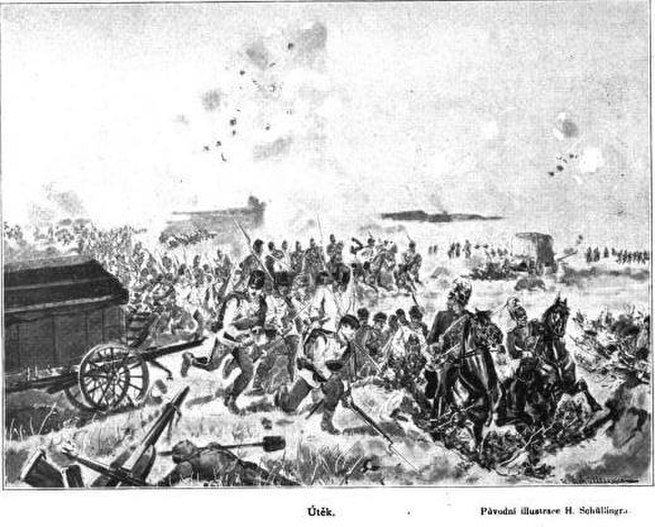
-
Rout
A rout is a chaotic and disorderly retreat or withdrawal of troops from a battlefield, resulting in the victory of the opposing party, or following defeat, a collapse of discipline, or poor morale. A key feature of a true rout is that the routed forces abandon equipment, especially weapons.
A routed army often disintegrates into a state of “every man for himself” or sauve qui peut as the survivors flee for safety. A rout often results in much higher casualties for the retreating force than an orderly withdrawal. On many occasions, more soldiers are killed in the rout than in the actual battle. Normally, though not always, routs either end a battle or provide the moment the winner needs to win decisively a battle (or even campaign).
The opposite of a rout is a rally, in which a military unit that has been giving way and is on the verge of a rout, suddenly gathers itself and turns back to the offensive. More commonly, the over-matched force retires in good order without losing cohesion as a military unit.
The recommended reaction to an enemy’s rout is to launch your reserves, especially reserve cavalry, in a pursuit. A pursuit, which is normally conducted without support on its flanks, is itself a dangerous operation, in the category of “all or nothing”, since the pursuing force itself might be cut off and destroyed. Therefore, experience and judgment are required to recognize a rout and make the decision to conduct a pursuit.
-
Rout (verb)
To make a noise; roar; bellow; snort.
-
Rout (verb)
To snore; snore loudly.
-
Rout (verb)
To belch.
-
Rout (verb)
To howl as the wind; make a roaring noise.
-
Rout (verb)
To beat; strike; assail with blows.
-
Rout (verb)
To defeat completely, forcing into disorderly retreat.
-
Rout (verb)
To retreat from a confrontation in disorder.
-
Rout (verb)
To assemble in a crowd, whether orderly or disorderly; to collect in company.
-
Rout (verb)
To search or root in the ground, like a pig.
-
Rout (verb)
To scoop out with a gouge or other tool; to furrow.
-
Rout (verb)
To use a router in woodworking.
-
Rout (noun)
A noise; a loud noise; a bellowing; a shouting; clamor; an uproar; disturbance; tumult.
-
Rout (noun)
Snoring.
-
Rout (noun)
A violent movement; a great or violent stir; a heavy blow; a stunning blow; a stroke.
-
Rout (noun)
A troop or group, especially of a traveling company or throng.
-
Rout (noun)
A disorderly and tumultuous crowd; a mob; hence, the rabble; the herd of common people.
-
Rout (noun)
The state of being disorganized and thrown into confusion, especially when retreating from a fight.
-
Rout (noun)
The act of breaking up an army or another opponent.
“The rout of the enemy was complete.”
-
Rout (noun)
A disturbance of the peace by persons assembled together with the intent to do a thing which, if executed, would make them rioters, and actually making a motion toward the executing thereof.
-
Rout (noun)
A fashionable assembly, or large evening party.
-
Route (noun)
A course or way which is traveled or passed.
“The route was used so much that it formed a rut.”
“You need to find a route that you can take between these two obstacles.”
-
Route (noun)
A regular itinerary of stops, or the path followed between these stops, such as for delivery or passenger transportation.
“We live near the bus route.”
“Here is a map of our delivery routes.”
-
Route (noun)
A road or path; often specifically a highway.
“Follow Route 49 out of town.”
-
Route (noun)
One of multiple methods or approaches to doing something.
-
Route (noun)
One of the major provinces of imperial China from the Later Jin to the Song, corresponding to the Tang and early Yuan circuits.
-
Route (verb)
To direct or divert along a particular course.
“All incoming mail was routed through a single office.”
-
Route (verb)
to connect two local area networks, thereby forming an internet.
-
Route (verb)
To send (information) through a router.
